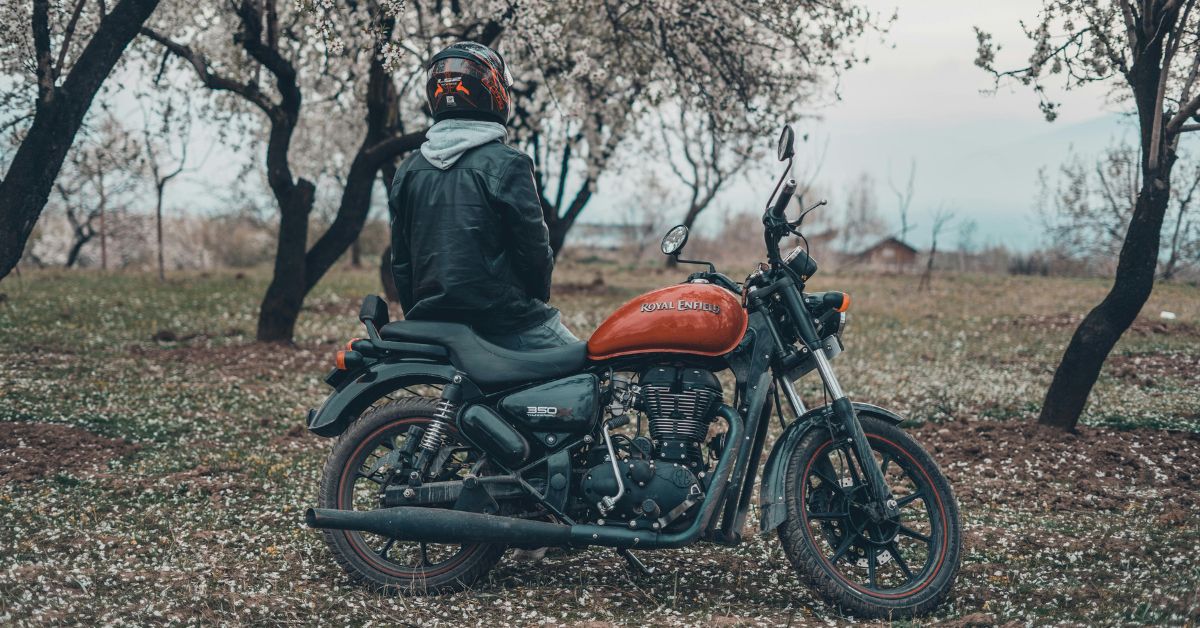Have you ever felt clueless on how to clean your motorcycle gear?
Many riders feel the same way. In fact, a 2023 RevZilla consumer survey found that over 60% of riders clean their gear less than twice a year. Nonetheless, even the best gear can fail if it’s neglected. Poor hygiene and maintenance lead to faster wear, reduced performance, and even a risk to your safety.
Lucky for us, motorcycle gear maintenance is more about knowledge than skill.
When my husband and I first met, we lived in a remote mining town called Kalgoorlie in Western Australia. This town is mainly known for its large open pit gold mine, but also for the red dust that covered every surface of every object in the town. We got very good at cleaning everything, including motorcycle gear, so that the red dust didn’t bury us!
Therefore, I wrote this guide to walk you through the basics on how to clean your motorcycle gear. We’ll go through looking after your core gear, which includes helmets, boots, gloves and jackets. A few quick tips can change something daunting into an easy routine!
Keep reading to find out how to ensure your gear lasts longer, performs better and stays fresh ride after ride.


How to Clean Your Motorcycle Gear: Why It Matters
Before diving into the how-to, let’s talk about why knowing how to clean your motorcycle gear matters more than ever.
Proper maintenance does more than extend your gear’s life—it directly impacts your safety. Dirty visors reduce visibility. Sweat-soaked gloves compromise grip. A jacket that hasn’t been waterproofed becomes a liability in the rain.
According to the Journal of Safety Research, neglected riding gear can degrade up to 30% faster, reducing its protective effectiveness in an accident. This is especially true for leather and textile gear that isn’t properly cleaned and reconditioned.
Therefore, regular cleaning:
- Maintains waterproofing, ventilation, and fit
- Eliminates bacteria and odors
- Reduces material breakdown caused by sweat, UV exposure, and road grime
- Protects reflective panels, zippers, and stitching
If you’ve invested in high-quality gear, regular care isn’t optional—it’s essential.
Pro Tip: Invest as much as your budget allows into your motorcycle safety gear. As a young woman who enjoys looking nice, I have had to learn the difference between paying for fashion and paying for function. Anything that is worn for a purpose (e.g. helmet, jacket, boots) should be bought at the top of your affordable range. Optional extras should be recognised for what they are and only bought after your main gear is covered.

How to Clean Motorcycle Helmets
Your helmet is arguably the most critical piece of gear. Keeping it clean protects not only the shell and visor but your skin and lungs too.
Here is how to get started:
- Exterior shell: Use a mild soap (baby shampoo or a pH-neutral cleaner) and a microfiber cloth to remove bugs, dirt, and grime. Avoid harsh solvents that degrade polycarbonate
- Visor/face shield: Rinse with warm water, then use a non-abrasive cloth. Anti-fog coatings are sensitive—never scrub
- Interior liner: If removable, soak it in warm water and mild detergent. If non-removable, use a helmet interior spray
- Vents and seals: Clean dust and bugs using a soft-bristle brush or canned air
Helmet drying tip: Always air-dry your helmet indoors, out of direct sunlight, to prevent UV damage and warping.
A clean helmet doesn’t just look better—it performs better and keeps you healthy during long rides. For tips on keeping your hair and scalp healthy—which directly helps maintain helmet cleanliness—be sure to check out our detailed guide on hair care for motorcycle riders.
Pro-Tip: If you expect to be using your helmet on wet, salty or in very sweating and humid conditions, consider wearing a moisture-wicking liner or scalp cap. They are ugly, I understand that, but they make a world of difference. When my husband and I went on a month long summer cruise in Italy, I actually wore one every day with no shame. No nasty helmet for me!

How to Clean Motorcycle Jackets (Leather and Textile)
Your riding jacket sees it all—sun, sweat, rain, and the occasional insect ambush. The cleaning method depends on whether it’s textile or leather.
To clean textile motorcycle jackets:
- Remove all armor and fasten zippers/velcro
- Check the care tag—many can be machine washed in cold water on gentle cycle
- Use a gear-specific cleaner or a mild detergent (no bleach or fabric softeners)
- Hang dry completely before reassembling
To clean leather motorcycle jackets:
- Wipe with a damp microfibre cloth to remove surface grime
- Use saddle soap or leather cleaner, applied in circular motions
- Condition with a leather conditioner to maintain flexibility
- Re-waterproof with a UV-resistant leather protectant
Therefore, taking the time to clean and maintain your jacket ensures that it stays breathable, protective, and stylish for seasons to come.
Pro-Tip: If you asked me what a dry cleaner was in my twenties, I wouldn’t have been able to tell you what they do. Anything and everything was shoved into the washing machine, as I hoped for the best. Once I ruined a couple of expensive sweaters, I started to appreciate dry cleaning services. Now, not every dry cleaner understands motorcycle gear, but they do understand textiles. If you have a unique clothing item (or gear), you could always ask them!
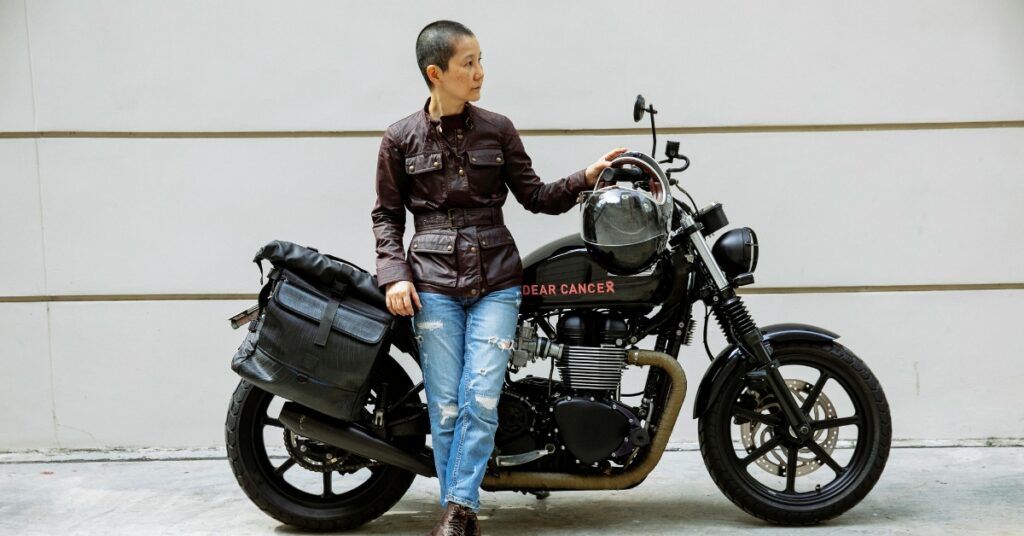
Cleaning Motorcycle Gloves: Fabric, Leather, and Hybrid
Motorcycle gloves absorb sweat, collect bugs, and face constant abrasion. As a result, cleaning them often will allow you to maintain grip, dexterity, and odour control.
Cleaning methods by material:
- Textile gloves: Soak in warm water with mild detergent. Gently hand wash, rinse, and air dry
- Leather gloves: Use a damp cloth and saddle soap. Never soak leather. Apply conditioner once dry to prevent stiffness
- Hybrid gloves: Follow the leather cleaning method on leather areas and gentle washing on fabric sections
Similarly, velcro, reflective materials, and inner linings should be cleaned carefully using a toothbrush or soft sponge.
Clean gloves equal better control—and better control equals a safer, more enjoyable ride. If you want to learn how to find the best gloves for your riding style, have a look at how to choose motorcycle gloves for beginners.
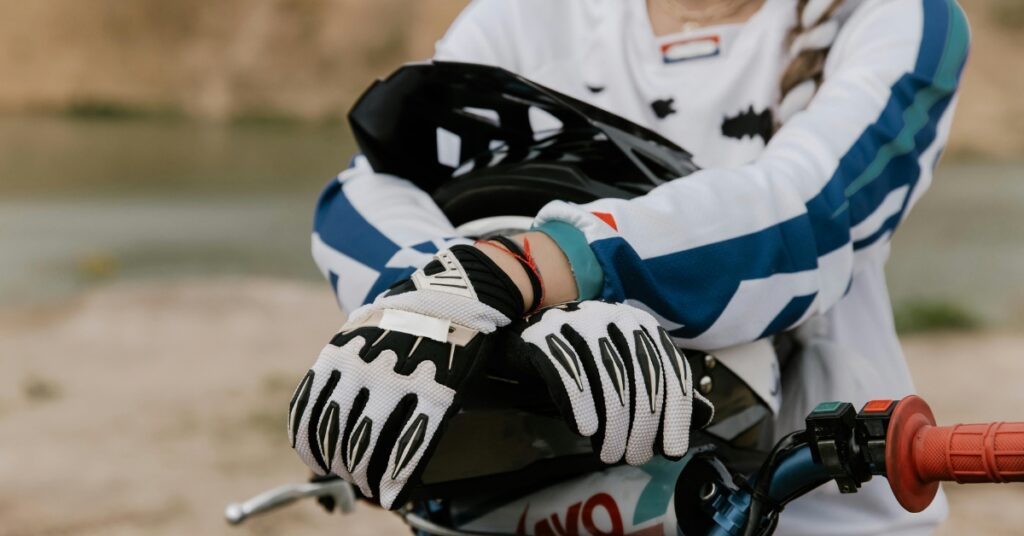
How to Clean Motorcycle Boots Without Damage
Boots are your most rugged gear—but they’re not indestructible. Cleaning keeps them watertight, odor-free, and flexible.
To clean motorcycle boots:
- Remove mud and debris with a soft brush or damp rag
- For leather: use saddle soap followed by leather conditioner
- For textile boots: wipe down with diluted detergent; rinse thoroughly
- Dry with boot dryers or stuff with newspaper to absorb moisture
- Don’t place them near heaters—it can crack leather and weaken adhesives
- Apply waterproofing spray once dry to keep them ready for any forecast.
As a result, well-maintained boots protect you from slips, wet rides, and premature wear—so make cleaning them a habit.
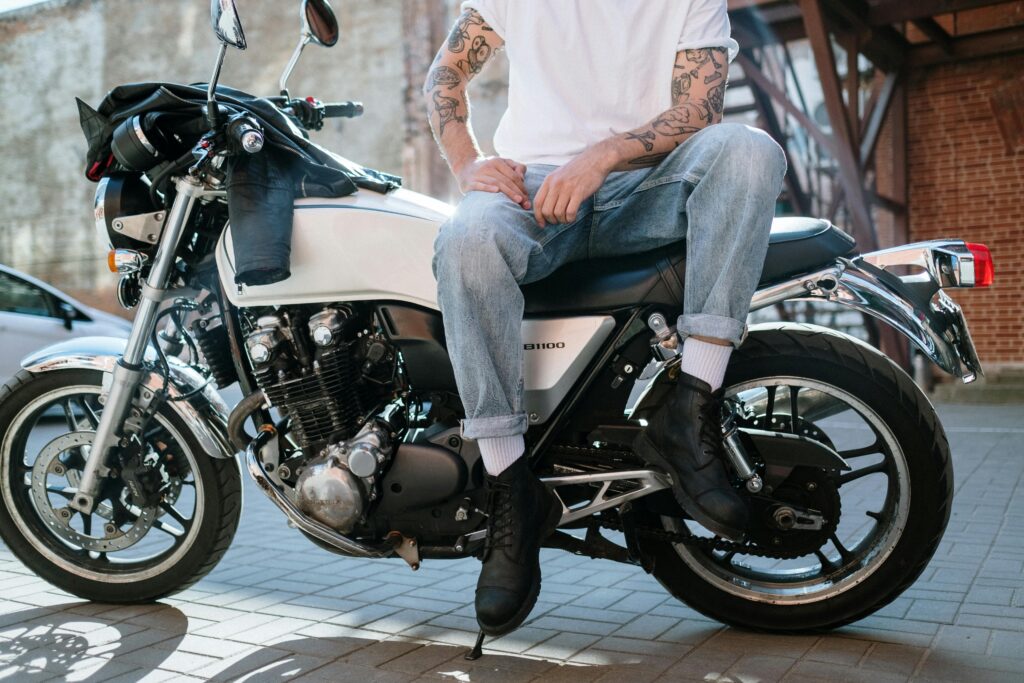
Cleaning Armour Inserts, Base Layers, and Accessories
Armor inserts, base layers, and gear accessories also need occasional cleaning to stay hygienic and effective.
Armor inserts:
- Remove and wipe with a damp cloth
- Allow to air dry fully before reinserting into jackets/pants
Base layers (moisture-wicking):
- Machine wash cold, mild detergent, air dry
- Avoid fabric softeners, which reduce moisture-wicking capability
Other gear:
- Backpacks/luggage: wipe with mild soap and water; use brush on zippers and webbing
Your motorcycle gear ecosystem includes more than just the big pieces. Keep every element clean for peak performance and hygiene.

Products and Tools to Clean Your Motorcycle Gear Safely
Not all cleaning products are gear-safe. Here’s a go-to list:
- Helmet interior spray
- pH-neutral detergent
- Saddle soap and leather conditioner
- Waterproofing spray
- Soft-bristle brush and microfiber towels
- Mesh gear drying rack or hangers
Avoid: bleach, alcohol-based cleaners, high heat dryers, and household fabric softeners.
Investing in the right gear-care tools ensures you won’t accidentally damage your expensive riding equipment.
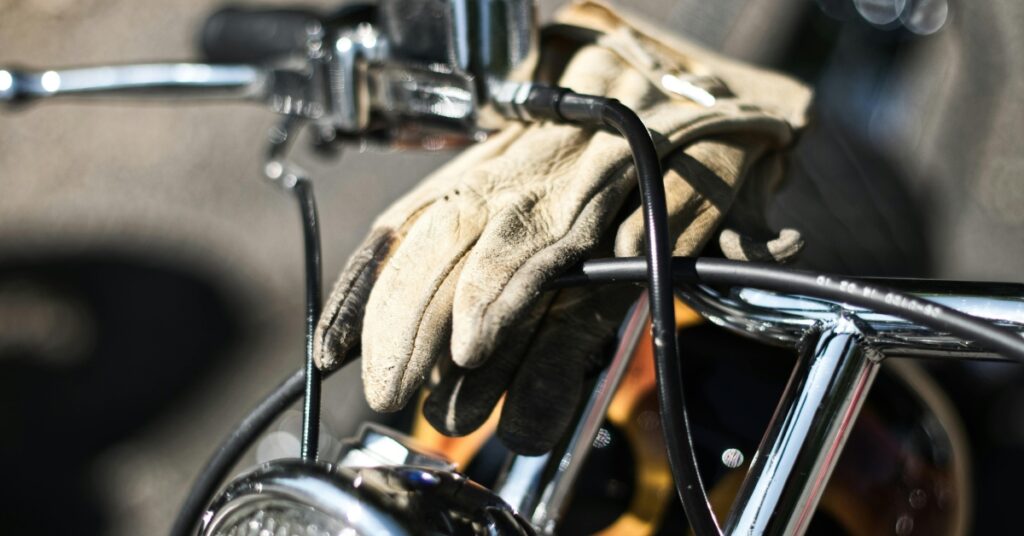
How Often Should You Clean Your Motorcycle Gear?
A good rule of thumb: clean visible surfaces after every few rides and deep clean monthly. But climate, ride frequency, and gear material can affect timing.
Recommended cleaning frequency:
- Helmet: Spot clean weekly, deep clean monthly
- Jacket/Pants: Every 1–2 months or after a wet/dirty ride
- Gloves/Boots: Weekly if used daily
- Base layers: After every ride
- Armour inserts: Monthly or after intense use
Don’t wait for visible dirt. Set a schedule, and your gear will thank you with years of high-performance protection.
Pro-Tip: Anything that directly touches sweaty skin should be washed each time it is used. With motorcycling this mostly refers to base layers (not including the helmet lining as that is quite impractical). Make sure you review your washing machine, use a cold cycle and delicate wash. Avoid the dryer as it can shrink your clothing, especially any wool items. Base layers can be quite expensive, particularly if they are bought for winter climates. Read the inside tags and wash accordingly.
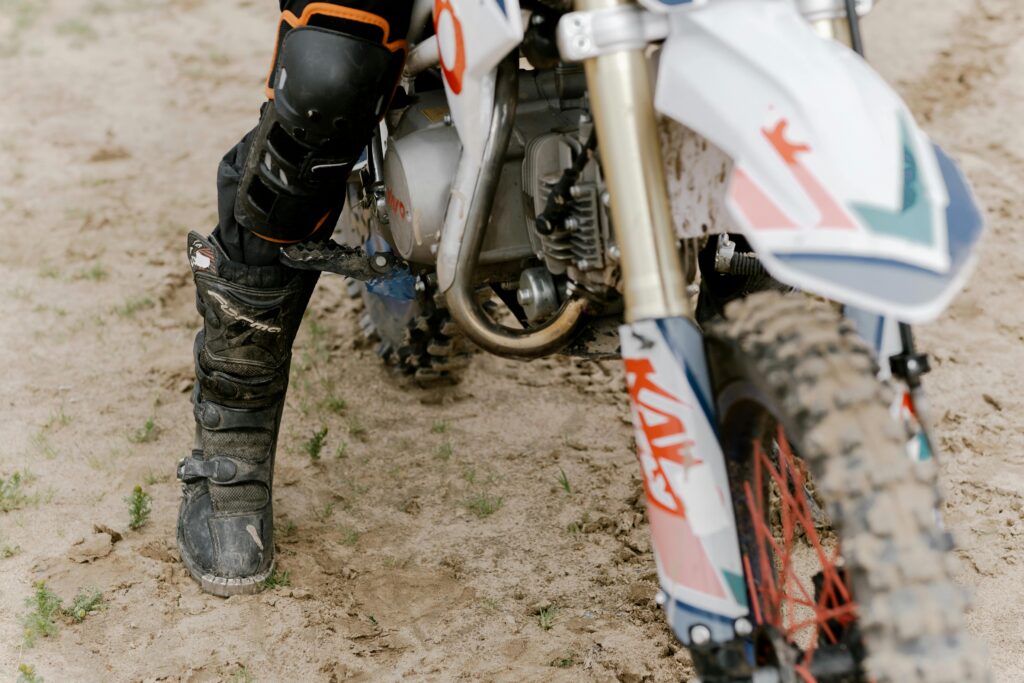
Caring for Motorcycle Tech and Accessories
Cleaning your motorcycle gear doesn’t stop at jackets and helmets. Accessories like GPS units, comm systems, and action cameras also need regular maintenance to function reliably and look sharp on the road.
- GPS units: Wipe with a microfiber cloth and screen-safe cleaner. Avoid alcohol-based products that can damage coatings.
- Helmet intercoms: Detach parts if possible and gently clean with a damp cloth. Keep moisture away from ports and buttons.
- Handlebar tech: Use electronics-safe wipes to clean phone mounts and USB ports—sweat and grime build up fast here.
- Action cameras: Clean lenses with a lens cloth. Clear grit from joints and mounts to prevent wear.
- Updates: Regularly check for firmware or app updates to keep your tech running smoothly.
Keeping your accessories clean not only improves performance and longevity, but also ensures everything is ready when you need it most—whether for navigation, safety, or communication on the road.
To find out what new riders really need, have a look at this guide on motorcycle accessories for beginners.

FAQ: How to Clean Your Motorcycle Gear?
Q. Can I machine wash my motorcycle jacket and pants?
Yes, if your gear is made from textile materials and the care tag specifically allows machine washing. Always remove any protective armour beforehand to avoid damage. Use cold water and a mild detergent designed for delicate fabrics to preserve the gear’s durability and protective qualities.
Q. What happens if I don’t clean my motorcycle gear regularly?
Over time, accumulated grime, sweat, and dirt can degrade your gear’s materials, reduce waterproofing capabilities, and cause unpleasant odours. In helmets, the buildup of bacteria can also lead to skin irritation or infections, making regular cleaning essential for both safety and comfort.
Q. How do I remove stubborn bugs from my visor or jacket?
The best approach is to soak the affected area with a warm, damp cloth for several minutes. This softens the bug residue, allowing you to gently wipe it away without scratching or damaging the surface of your visor or jacket.
Q. How do I know when to replace my gear instead of cleaning it?
Watch out for signs like fraying seams, degraded or cracked armour, and worn or cracked leather. Persistent foul odors can also indicate problems. Additionally, if your helmet liner has compressed and no longer fits snugly, it’s a warning sign. These issues suggest your gear may no longer offer adequate protection and should be replaced.
Q. Can I use regular shoe polish on my motorcycle boots?
No, regular shoe polish is not recommended. Instead, use a leather-specific conditioner or boot polish formulated for performance footwear. These products help maintain the boots’ breathability, flexibility, and waterproofing, extending their lifespan.

Final Thoughts
Now you know exactly how to clean your motorcycle gear from head to toe. Regular care doesn’t just make your gear last longer—it improves hygiene, comfort, and most importantly, safety.
By making gear maintenance part of your riding ritual, you protect your investment and elevate your experience. Whether you’re commuting, touring, or tackling weekend twisties, clean gear keeps you focused and confident.
Looking for more ways to stay protected and comfortable on the road? Check out how to choose motorcycle gloves for beginners, a step-by-step hair guide for riders and a complete guide to motorcycle gear.
What is your best way of cleaning motorcycle gear? Let me know in the comments!

